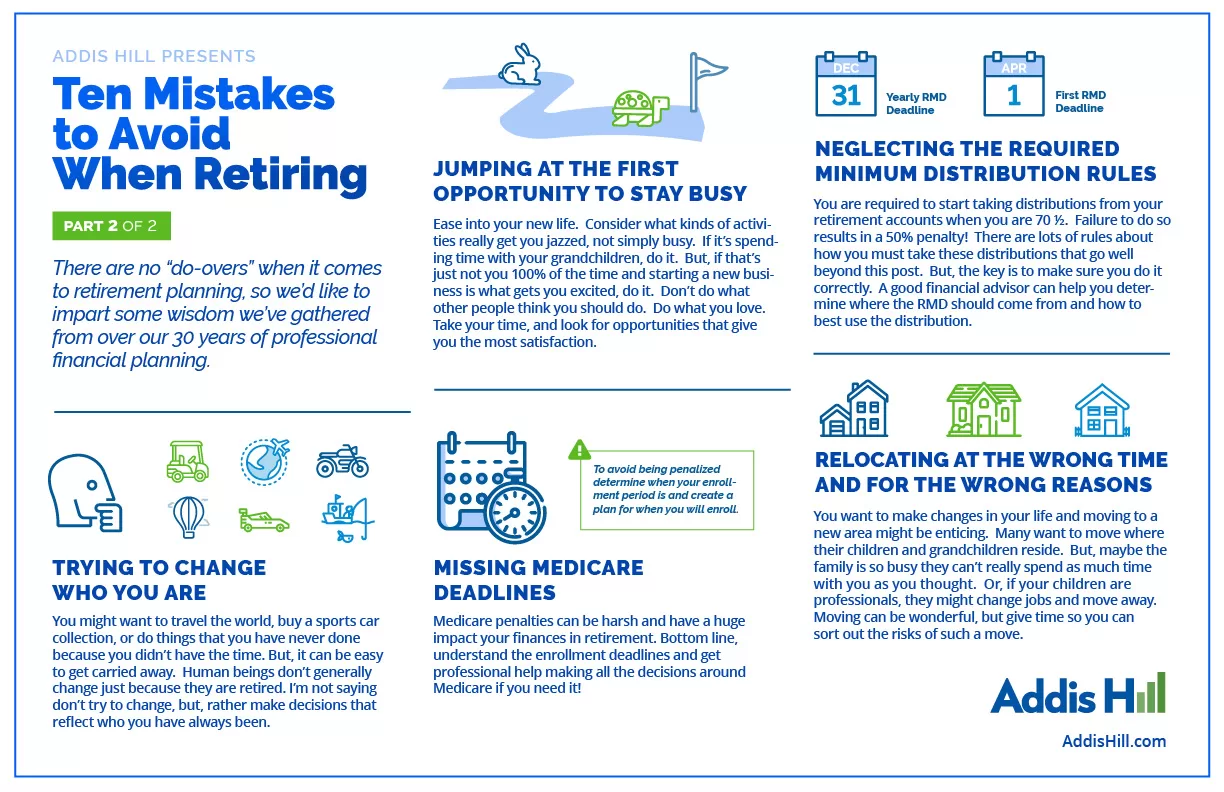Retirement is a time of transformation, a period when we finally have the freedom to pursue our passions and dreams. It’s an exciting phase of life, but it can also be fraught with pitfalls if we’re not careful. In this two-part series, we’ll explore the ten common mistakes to avoid when retiring. Whether you’re on the verge of retirement or just starting to plan for it, these insights can help you navigate this profound transition with wisdom and grace.
Table of Contents

Trying to change who you are
You might want to travel the world, buy a sports car collection, or do things that you have never done because you didn’t have the time. But it can be easy to get carried away. Human beings don’t generally change just because they are retired. I’m not saying don’t try to change, but rather make decisions that reflect who you have always been.
Jumping at the first opportunity to stay busy
Ease into your new life. Consider what kinds of activities really get you jazzed, not simply busy. If it’s spending time with your grandchildren, do it. But, if that’s just not you 100% of the time and starting a new business is what gets you excited, do it. Don’t do what other people think you should do. Do what you love. Take your time and look for opportunities that give you the most satisfaction.
Missing Medicare deadlines
Medicare penalties can be harsh and have a huge impact your finances in retirement. Bottom line, understand the enrollment deadlines and get professional help making all the decisions around Medicare if you need it!
Neglecting the required minimum distribution rules
You are required to start taking distributions from your retirement accounts when you are 70 ½. Failure to do so results in a 50% penalty! There are lots of rules about how you must take these distributions that go well beyond this post. But the key is to make sure you do it correctly. A good financial advisor can help you determine where the RMD should come from and how to best use the distribution.
Relocating at the wrong time and for the wrong reasons
You want to make changes in your life and moving to a new area might be enticing. Many want to move where their children and grandchildren reside. But maybe the family is so busy they can’t really spend as much time with you as you thought. Or, if your children are professionals, they might change jobs and move away. Moving can be wonderful but give time so you can sort out the risks of such a move.
In conclusion
Retirement is not just the end of a career; it’s the beginning of a new chapter in your life story. As you embark on this journey, remember that your core identity remains unchanged. While retirement offers the chance to explore new interests and adventures, it’s essential to stay true to yourself. Take your time to discover what truly excites you and fuels your passion, whether it’s traveling the world or starting a new business. Don’t be swayed by others’ expectations; do what you love.
Additionally, be diligent when it comes to critical financial matters like Medicare enrollment and required minimum distributions. Missing deadlines in these areas can have significant financial consequences. Seek professional advice when needed to ensure you make informed decisions.
Lastly, if relocating is on your retirement agenda, carefully weigh the pros and cons. Moving can be a wonderful experience, but it’s essential to assess whether the timing and reasons align with your long-term goals. The key is to approach retirement with thoughtful planning, embracing the opportunity for personal growth and fulfillment while avoiding common pitfalls. Stay tuned for Part 2, where we’ll delve into more retirement planning essentials to help you make the most of your retirement years.


